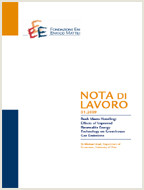Carbon Taxes, Path Dependency and Directed Technical Change: Evidence from the Auto Industry

Data
21.12.2012
21.12.2012
Autori
Philippe Aghion, Antoine Dechezleprêtre, David Hemous, Ralf Martin and John Van Reenen
Codice JEL
O3, O13, L62
O3, O13, L62
Parole chiave:
Climate Change, Innovation, Directed Technical Change, Automobiles
Climate Change, Innovation, Directed Technical Change, Automobiles
Publisher
Climate Change and Sustainable Development
Climate Change and Sustainable Development
Editor
Carlo Carraro
Carlo Carraro
Can directed technical change be used to combat climate change? We construct new firm-level panel data on auto industry innovation distinguishing between “dirty” (internal combustion engine) and “clean” (e.g. electric and hybrid) patents across 80 countries over several decades. We show that firms tend to innovate relatively more in clean technologies when they face higher tax-inclusive fuel prices. Furthermore, there is path dependence in the type of innovation both from aggregate spillovers and from the firm’s own innovation history. Using our model we simulate the increases in carbon taxes needed to allow clean to overtake dirty technologies.
